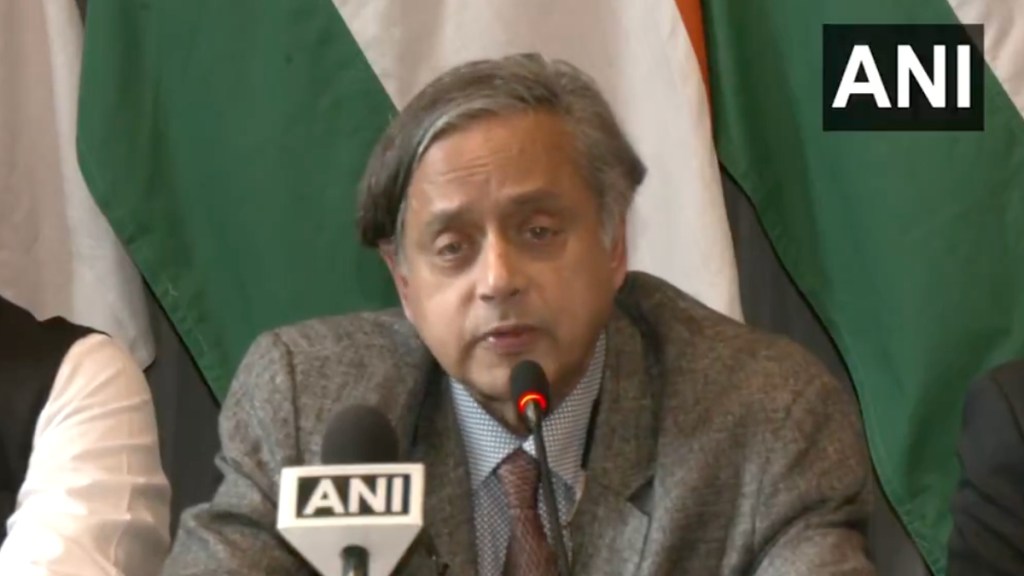Shashi Tharoor made it clear that India will not engage in dialogue with Pakistan so long as it continues to support cross-border terrorism. Tharoor, who is leading an all-party delegation to the United States to brief stakeholders on Operation Sindoor, also rejected Washington’s narrative that trade diplomacy played a key role in de-escalating tensions between the two nuclear-armed neighbours.
Pakistan delegation that landed in Washington on Wednesday to counter global narratives following India’s decisive anti-terror action under Operation Sindoor, its efforts were swiftly overshadowed by India’s proactive outreach led by Congress MP Shashi Tharoor.
Speaking candidly, on Pakistan sending delegation led by Bilawal Bhutto to US after India’s ‘Operation Sindoor’ diplomatic success, Tharoor said, “They (Pakistan) are claiming to be innocent, had nothing to do with this and they themselves are victims of terrorism. Indeed, I know that Bilawal Bhutto’s mother was killed and one sympathise with the young man for the loss of his mother to terrorism. But, the famous quote of Hillary Clinton comes back to haunt all the Pakistan which is ‘How can you breed vipers in your backyard and expect them to bite only your neighbours?”
Tharoor noted that Pakistan is now facing blowback from the very forces it once nurtured, including the Tehrik-i-Taliban Pakistan.
Highlighting Islamabad’s role in fostering militant networks, Tharoor urged Pakistan to engage in serious introspection instead of seeking global sympathy or plausible deniability. His remarks reinforced India’s position that the global community must hold Pakistan accountable for its long-standing complicity in cross-border terrorism.
“We won’t talk with a gun at our head”
Responding to questions about US efforts to facilitate India-Pakistan dialogue, Tharoor stated unequivocally, “India has a very clear position that there will be no talks with a gun pointed at our head.” He used a stark metaphor to explain India’s dilemma: “If your neighbor unleashes his Rottweilers to bite your children and then says ‘let’s talk,’ you’re not going to talk until he locks them up or puts them to sleep.”
He emphasised that India is open to discussions, but only in an environment free of threats and terror: “It’s not that we can’t talk to Pakistan — we speak all the same languages — but we won’t dialogue under threat.”
Dismissing the “trade diplomacy” narrative
Tharoor took particular issue with US President Donald Trump’s claims that it was US trade diplomacy that prevented a full-scale war following the Pahalgam terror attack. “That’s not the impression I have,” Tharoor said. “In none of these calls — from the US, France, UAE, Saudi Arabia — was trade ever mentioned. Not once.”
According to Tharoor, multiple countries reached out to India with calls for de-escalation, but India consistently reiterated that its actions under Operation Sindoor were targeted responses to terrorism, not acts of aggression. “We are not interested in prolonging the conflict,” he added.
Tharoor made it clear that the Indian delegation’s visit to the US was not about negotiating outcomes. “That’s the government’s job,” he said. “We’re here to clarify our position, answer any questions, and enhance understanding. We’re not asking them to do anything — just to understand and, if necessary, stand with us in the future.”
He stressed that India’s position is rooted in self-defence. “If Pakistan stops, we will stop. But if they hit us, we will hit back. That’s our right.”
Warning of future retaliation if terror persists
Referring to Operation Sindoor, Tharoor acknowledged that terror camps destroyed in Pakistan and PoK could be rebuilt. “These camps can come back in six or nine months. But if they think they can keep doing this to us, they’ve got another thing coming.”
He warned that future provocations would meet with swift retaliation and called on the international community to understand “not only what just happened, but what could happen again if Pakistan does not control these elements.”
Tharoor reiterated that India does not seek conflict. “We are focused on growth, development, and progress. But we will not live in fear — and we will not allow terror to go unanswered.”

